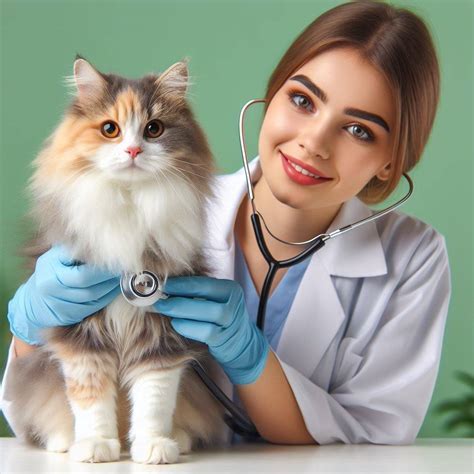Introduction

Cats are beloved companions that bring immense joy into our lives. Ensuring their well-being and longevity requires regular health check-ups and meticulous maintenance. This comprehensive guide explores the essential aspects of feline healthcare, empowering cat owners with the knowledge and techniques to keep their furry friends thriving for years to come.
Importance of Regular Health Check-ups
Regular health check-ups are vital for detecting potential health issues early on, when they are most manageable and treatable. According to the American Veterinary Medical Association (AVMA), early detection and intervention can significantly improve cats’ chances of a long and healthy life.
Schedule of Health Check-ups
The frequency of health check-ups depends on a cat’s age, lifestyle, and overall health. As a general guideline:
| Age | Frequency |
|---|---|
| Kitten (0-12 months) | Every 2-4 weeks |
| Young Adult (1-6 years) | Every 6-12 months |
| Senior (7+ years) | Every 3-6 months |
Routine Health Check-up Procedures
During a routine health check-up, your veterinarian will typically perform the following procedures:
Physical Examination:
- Visual inspection of the body, coat, and skin for any abnormalities
- Examination of eyes, ears, mouth, and teeth
- Palpation of the abdomen, chest, and limbs
- Assessment of body weight and condition score
Blood Work:
- Complete blood count (CBC) to evaluate red blood cells, white blood cells, and platelets
- Serum chemistry panel to assess liver and kidney function, electrolyte balance, and blood sugar levels
Urinalysis:
- Examination of urine to detect any abnormalities in color, concentration, and the presence of cells or crystals
Dental Examination:
- Inspection of the teeth and gums for any signs of dental disease, such as tartar, cavities, or gum inflammation
Additional Tests:
- Based on the cat’s age, breed, and health history, your veterinarian may recommend additional tests, such as:
- Fecal exam to check for parasites
- Radiographs (X-rays) to evaluate the bones and internal organs
- Ultrasound to visualize the heart, abdomen, or other organs
Essential Maintenance for Cats
In addition to regular health check-ups, proper maintenance is crucial for maintaining your cat’s well-being. Key maintenance practices include:
Nutrition:
- Provide a balanced, high-quality diet appropriate for your cat’s age and activity level.
- Avoid feeding table scraps or human food, which can be harmful to cats.
- Ensure your cat has access to fresh water at all times.
Exercise:
- Engage your cat in regular play sessions to promote mental and physical stimulation.
- Provide toys and scratching posts to encourage exercise and prevent boredom.
Grooming:
- Brush your cat’s fur regularly to remove loose hair and prevent matting.
- Bathe your cat as needed, using a cat-specific shampoo.
- Trim your cat’s nails regularly to prevent scratching and discomfort.
Litter Box Habits:
- Provide your cat with a clean litter box in a private location.
- Scoop the litter box daily to prevent odor and bacteria buildup.
- Monitor your cat’s litter box habits for any changes that may indicate a health issue.
Flea and Tick Prevention:
- Use a flea and tick prevention product recommended by your veterinarian.
- Check your cat regularly for fleas and ticks, especially after being outdoors.
Other Maintenance:
- Keep your cat’s environment clean and free of hazards.
- Provide a scratching post to prevent scratching furniture.
- Socialize your cat with people and other animals to promote social well-being.
Benefits of Regular Check-ups and Maintenance
Adhering to a regular health check-up and maintenance plan offers numerous benefits for your cat:
- Early detection and management of health problems
- Longer lifespan and improved quality of life
- Reduced risk of unexpected expenses associated with major illnesses
- Peace of mind for cat owners knowing their feline friend is receiving optimal care
Future Trends in Cat Health Care
The future of cat health care holds exciting advancements and technological innovations:
- Telemedicine: Remote veterinary consultations via video call or chat, offering convenience and accessibility.
- Wearable technology: Tracking devices to monitor cats’ activity levels, sleep patterns, and vital signs.
- Personalized medicine: Tailored treatments based on a cat’s unique genetic makeup and lifestyle.
- Regenerative medicine: Using stem cells and other innovative therapies to repair or replace damaged tissues.
How to Enhance Your Cat’s Health and Well-being
- Establish a relationship with a trusted veterinarian: Choose a veterinarian who is knowledgeable, compassionate, and dedicated to your cat’s well-being.
- Keep a health record: Maintain a detailed record of your cat’s medical history, vaccinations, and treatments.
- Observe your cat’s behavior: Monitor your cat’s daily habits and report any changes to your veterinarian promptly.
- Educate yourself: Stay informed about feline health care through reliable sources and consult your veterinarian for guidance.
- Provide a loving and supportive environment: Create a safe and enriching environment where your cat feels secure and content.
Conclusion
Regular health check-ups and meticulous maintenance are essential to ensuring the health, happiness, and longevity of our beloved feline companions. By embracing these practices and staying informed about advancements in cat health care, we can provide our furry friends with the best possible care and extend their time with us in the years to come.





















